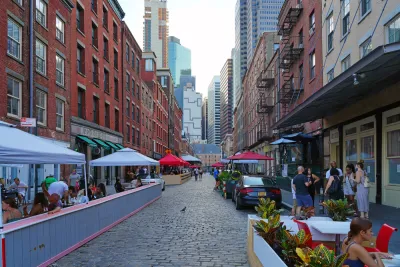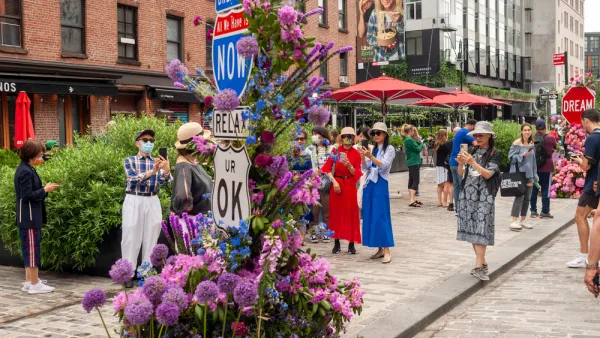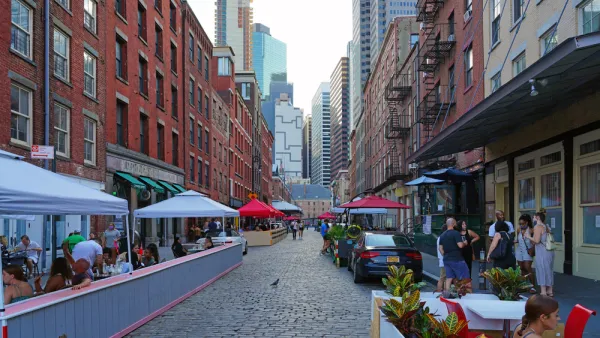The effort to reclaim public and private spaces from car storage had some setbacks since the days of al fresco and open streets in the first years of Covid-19. But widespread parking reforms and new evidence shows the public is rethinking parking.

The empty streets and suffering business that defined the early months of the Covid-19 pandemic also prompted a fresh look at the public realm, inspiring many cities and communities to reclaim and transform some of the spaces previously reserved for automobile storage into spaces for other activities, such as play, dining, and exercise.
The programs that recovered parking spaces for more active, human uses retreated, to a degree, in the ensuing months and years: while some cities have made outdoor dining programs and parklets permanent, others have reopened streets to cars, rescinded permitting programs, and dialed back ambitions for a post-parking future.
Oliver Moore, writing for the Globe and Mail, makes the case that despite these setbacks for the cause, "the broader pattern is a gradual dismantling of the decades-long assumption that more parking is inherently better." Moore points to the parking reforms underway in Canadian cities, first in Edmonton, followed by more than a dozen other cities as support for the argument (the parking reform trend is also obvious in the United States).
"Perhaps the biggest recent shift in attitudes around parking has been the recognition of just how much value may be forgone by using desirable urban real estate as car storage," writes Moore. A recent report assigns financial value to the choice between parking or other uses of urban space.
Researchers for an association of local business improvement areas estimated that customers spent $181-million in the repurposed parking spaces in the summer of 2021. The same spaces would have generated $3.7-million in parking revenue, according to the local parking authority, and even that modest figure assumed prepandemic levels of demand.
Moore's conclusion, with more examples and and appeals to authority, included in the source article (which requires an email to read for free): people are slowly waking up to the idea that parking doesn't play the same role in cities as it did in the 1950s.
FULL STORY: New spin on parking spaces during pandemic reaps benefits

National Parks Layoffs Will Cause Communities to Lose Billions
Thousands of essential park workers were laid off this week, just before the busy spring break season.

Retro-silient?: America’s First “Eco-burb,” The Woodlands Turns 50
A master-planned community north of Houston offers lessons on green infrastructure and resilient design, but falls short of its founder’s lofty affordability and walkability goals.

Delivering for America Plan Will Downgrade Mail Service in at Least 49.5 Percent of Zip Codes
Republican and Democrat lawmakers criticize the plan for its disproportionate negative impact on rural communities.

Test News Post 1
This is a summary

Test News Headline 46
Test for the image on the front page.

Balancing Bombs and Butterflies: How the National Guard Protects a Rare Species
The National Guard at Fort Indiantown Gap uses GIS technology and land management strategies to balance military training with conservation efforts, ensuring the survival of the rare eastern regal fritillary butterfly.
Urban Design for Planners 1: Software Tools
This six-course series explores essential urban design concepts using open source software and equips planners with the tools they need to participate fully in the urban design process.
Planning for Universal Design
Learn the tools for implementing Universal Design in planning regulations.
EMC Planning Group, Inc.
Planetizen
Planetizen
Mpact (formerly Rail~Volution)
Great Falls Development Authority, Inc.
HUDs Office of Policy Development and Research
NYU Wagner Graduate School of Public Service





























